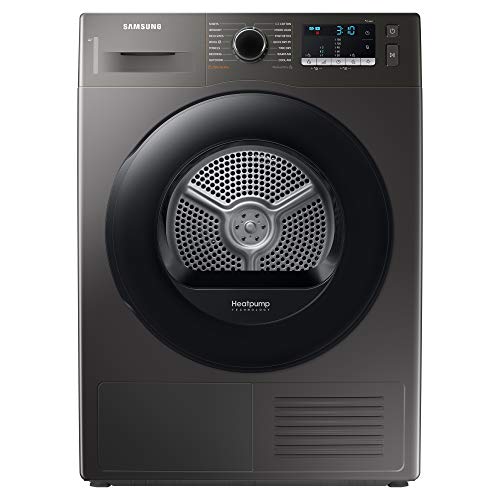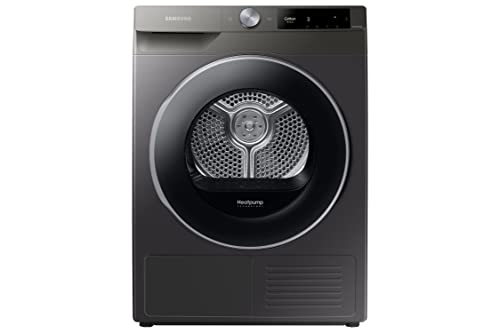The 10 Most Terrifying Things About Dryers Heat Pump
페이지 정보

본문
 Why Buy a washer dryer with heat pump With a Heat Pump?
Why Buy a washer dryer with heat pump With a Heat Pump?Like conventional gas or electric dryers, heat pump dryers warm air, and then pumps it into the drum. However, unlike them the warm air isn't pushed out into the vents -- where it could cause problems such as clogged and energy-consuming lint traps.
Ventless heat pump dryers can be installed anywhere, since they can cool the air and also remove moisture. Find out about their other advantages.
Energy Efficiency
While traditional vented dryers consume large amounts of energy to run while heat pump dryers consume just a tiny fraction of the energy. The reason for this is because they don't have to generate their own heat like traditional dryers. Instead they depend on a closed loop refrigerant unit that is similar to an air conditioner. The air that flows through the evaporator coils of the dryer is heated and absorbs moisture. The moisture is drained into a tray that can be emptied manually or connected to a drainage pipe. Then the cooled air moves through the coils, and the cycle repeats.
The result is that heat pump dryers consume approximately two-thirds less power per load than a conventional dryer according to Energy Star. They also do not require venting, which eliminates the potential for lint accumulation in dryer vents, thereby reducing the risk of fire. Since they're ventless, they can be used in any room that has access to an electrical outlet, which makes them ideal for apartments and other cramped spaces.
The efficiency of energy used by heat pump dryers also leads to lower utility costs. This is especially important considering the rising cost of electricity. The dryers that use heat are generally more expensive in the beginning but they pay for themselves in two years due to their lower operating costs.
Electric heat pump dryers consume substantially less energy than condensing dryers that don't make use of heat pumps. Their cycle times are more lengthy than conventional dryers.
If you're serious about reducing consumption of energy then a heat-pump dryer is the way to go. It is the most efficient way to dry your laundry and is powered by the electricity generated by solar energy or other renewable sources. If you're on the path towards a fully electric home, then a clothes dryer that is heated should be a component of the home. That's because it can be powered by the same renewable energy that powers your other appliances, like refrigerators and washers. As such, it can aid you in achieving the goal of an all-electric home by 2050.
Convenience
Many dryers that use heat pumps come with moisture sensors that help to prevent drying too long and save time and energy. Some dryers heat pumps also feature anti-wrinkle technologies and smart settings that are operated by smartphones. Certain ENERGY STAR certified models can even reuse the water used to eliminate humidity from the air during drying and save you money on disposal costs.
Heat pump dryers are more flexible than vented and ducted clothes dryers, since they do not require venting. They can be used in many different places, including basements or attics. The only drawback is that they take longer to dry laundry than standard dryers that use electricity because they don't require as much heat.
Rather than using hot air to dry clothes, as conventional gas and electric dryers do, heat pump dryers recycle the same air repeatedly again. A compressor presses a coolant in one set of coils to release heat. Then, it moves through an expander valve and into a different set of coils in which it cools down and absorbs moisture. This process is repeated over and over until the load is completely dry. This is a more efficient method of energy than traditional dryers that use energy by heating air continuously to dry the laundry.
The use of heat pump dryers may be expensive initially however, dryers heat Pump they are an eco-friendly option. They'll pay for themselves over the long term by reducing your energy bill. Many manufacturers offer incentives and rebates that can offset the initial costs of a dryer that uses a heater.
Some heat pump dryers need a drain hose that is specifically designed to eliminate the water used to remove moisture from air. This can raise the cost of the appliance. Although this isn't an enormous issue, it could be a deal breaker for some buyers.
Heat pump dryers have many other advantages that are worth considering. They are gentler on fabrics, extending their lifespan, while also looking good. They also cost less and can reduce your energy costs by as much as 28% compared with conventional dryers.
Durability
These dryers reduce energy costs and extend the life of clothing by recycling heat from the air. These dryers use the same method to remove water from clothing as vented models do, but do not release humid air to the outside. They recycle air that has been chilled. They typically take longer to dry than conventional vented dryers because they operate at lower temperatures.
They don't require vents and can be installed anywhere with electricity and water. They are ideal for tiny homes, accessory living units (e.g. an apartment above the garage) and additions. Some models are able to fit into tight spaces and others can be stacked. Larger ventless heat pump dryers which can earn the ENERGY STAR label, have more capacity.
Similar to traditional vented dryers these dryers heat pump feature an insulated drum that clothes tumble around in. The hot drum warms up as the clothes spin and squeezes out moisture. The water is then stored in an individual tank or drain hose which needs to be drained manually or automatically. Some dryers require a water tank to be cleaned every few cycles. Others have a self draining tank which requires less maintenance.
cheap heat pump tumble dryer pump dryers are more complex and require more maintenance than vented dryers. They also have higher repair costs. Despite these disadvantages, these machines are worth the investment for homeowners who want to lower their energy bills and save money over time.
Your laundry habits and budget are the primary aspects to take into consideration when deciding whether you should invest in a heat-pump dryer. If you are a frequent user of laundry and prefer to get it dry quickly, a vented dryer will be the ideal choice for you. If you want to save money over the long term and don't care about drying times of 2.5 hours, a heating pump dryer is an excellent option. They are energy efficient and can save you as much as $2,600 annually. They last twice longer than vented models.
Noise
Heat pump dryers are generally quieter than traditional dryers however, the level of noise can differ between models and brands. Understanding how noise levels are measured and comparisons between them can help customers choose the best model for their needs. If noise is a major concern, it can be helpful to plan to use the dryer during times when sleep and household activity patterns are likely to be less disturbed. Additionally, locating the dryer in an area that minimizes vibration, and separating it from the floor using rubber pads or anti-vibration mats can further reduce unwanted noise.
The squeaking or grinding sound can be an indication that the drum in the dryer is overloaded and struggling to turn. To avoid this, make sure to follow the manufacturer's recommendations for load capacity and avoid overfilling the dryer. Balancing larger items, like comforters and blankets, by balancing them with a few smaller items can also enhance performance and lessen the noise of grinding and squeaking during drying.
The sound of a heat pump dryer making a gurgling sound is normal. It is an indication that it is working according to plan. If the sound becomes more loud or persists it could indicate that your lint filters or dryer vents are blocked and require cleaning.
It is important to clean regularly the lint filter and dryer vent to ensure they are free of obstructions and ensure a properly functioning heat pump dryer. This will help prevent noises during the drying cycle, and prolong the life of the appliance.
 Some heat pump dryers claim that they can be run on conventional 120 volt and 15 amp electrical circuits. This is a great option for older homes with limited power outlets. This could be a deceitful marketing, as the majority of electric dryers require circuits that are 220-volt and have 30-amps to function correctly. Additionally running a heat pump dryer on a standard circuit can increase the chance of fire and electric shock. It is recommended that a professional electrician install a heater within a home that is already being used.
Some heat pump dryers claim that they can be run on conventional 120 volt and 15 amp electrical circuits. This is a great option for older homes with limited power outlets. This could be a deceitful marketing, as the majority of electric dryers require circuits that are 220-volt and have 30-amps to function correctly. Additionally running a heat pump dryer on a standard circuit can increase the chance of fire and electric shock. It is recommended that a professional electrician install a heater within a home that is already being used.- 이전글The Most Effective Reasons For People To Succeed At The Bio Ethanal Fire Industry 24.06.02
- 다음글5 Laws That Can Benefit The Best Squirting Dildos Industry 24.06.02
댓글목록
등록된 댓글이 없습니다.